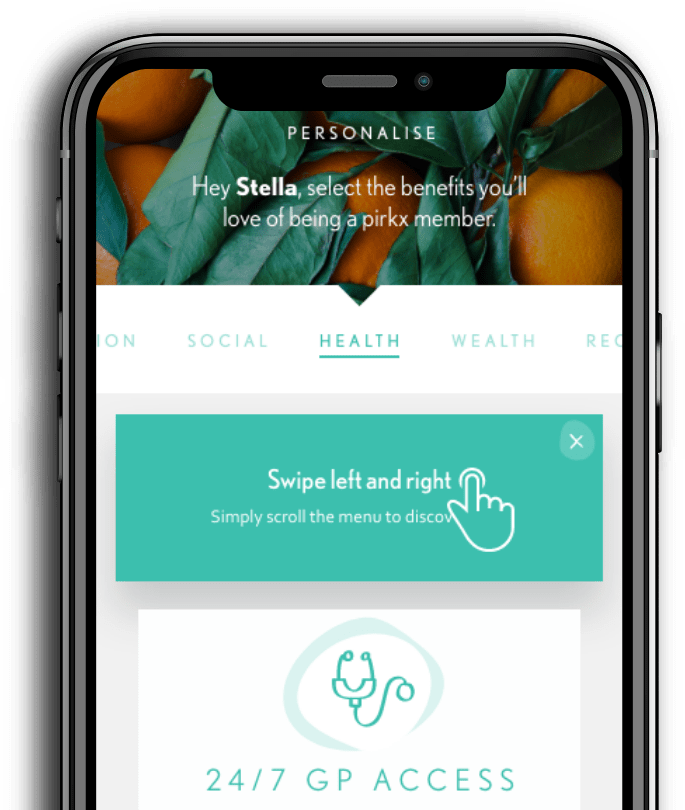- 30 March 2021
- Petra Velzeboer at pirkx
-
2 minutes read
Creating Uplifting Workplace Environments
In the past five years a much greater focus has been given to the importance of good workplace health and wellbeing.

The pace of technological change, always-on culture and change in consumer and younger generational needs has done a lot to drive this, and we have seen abgrowth in moral, societal demand and business cases to improve workplace environments as a result.
We have seen some great business examples and research that show a focus on organisational purpose and culture improves business results, productivity and employee wellbeing. Smart, forward-thinking employers that invest in staff wellbeing save money - period.
However, fast forward to 2021. Poor mental health is costing UK employers up to £45 billion – an increase of 16% since 2016. The global pandemic and prolonged period of home-working for many employees now means that a focus on mental health is not just about improving results for in-tune businesses, but a necessity for overall business survival, not to mention employee wellbeing. Looking out for employees working through a time of crisis, uncertainty and change is now seen as a duty of care for purpose-driven employers.
For so many people, the benefits of the initial ‘lockdown’ and home-working restrictions, such as reduced commute, more time spent with family and flexible working, have been outweighed with feelings of isolation, reduced human interaction and the blurring of lines between home and work life. Presenteeism is predicted to increase to the highest rate on record, particularly with a
large number of parents juggling home-schooling and work.
So how can employers create uplifting workplace environments for employees - provide a sanctuary and a space to thrive and be creative - under such challenging conditions?
Here are our top tips to help reinvigorate a virtual workplace and strengthen culture and belonging:
● Make team fun a priority. If yourself and your colleagues are missing the office camaraderie, as so many of us are, proactively suggest fun activities to take the focus away from work and inject that connection back into your team. Virtual coffee meetings, games, or quizzes are just some of the activities that can work here.
● Re-think meeting formats. Shake up the routine of zoom meetings by considering audio meetings where everyone goes on a walk simultaneously in their own local area. This is a way to lead by example to encourage movement and getting away from screens as a team exercise.
● Create positive accountability . Set each member of the team a task to invest and focus on themselves. Each week, a team member is asked to report back on the question ‘what's the one thing you did to invest in yourself?’
● Revisit your company/team purpose . Does it need an innovative refresh or a positive reminder? A team with shared purpose and goals feel inspired to work towards them together. People feel less uplifted if they don't believe in what they're working for.
● Create psychological safety . An environment in which people feel safe to be themselves; to offer ideas; to challenge; to experiment; to fail, learn, and innovate. Training and support on how to create psychological safety - particularly in a virtual world - is something that should be provided to all managers and leaders as a priority.
● Review communications processes . With everyone working remotely, what is the best way for your team to communicate effectively? Utilise tools and technology in a way that works for employees both individually and collectively.
● Produce, implement, and communicate a Mental Health at Work Plan. This should include:
○ Developing mental health awareness and knowledge amongst employees;
○ Encouraging open conversations about mental health and the support available when employees are struggling;
○ Conducting regular check-ins on the mental health of employees;
○ Prioritising a healthy work-life balance, as well as opportunities for training and development Access to mental health support/services. With 41% of workers experiencing burnout as a result of the pandemic (SHRM, 2020), these resources can help employees navigate these incredibly challenging times through additional psychological services.
Whatever you decide, always remember to measure engagement to support you in refining your programme throughout the year.
For more information on how to create an uplifting workplace environment or developing a mental health at work plan, please visit: https://petravelzeboer.com/

- Petra Velzeboer
- International Speaker. Mental Health Consultant. Podcast Host. Executive Coach. Psychotherapist. Training Provider

10 Problems only Freelancers Understand
Being a freelancer sounds glamorous: work from home, set your own hours,...
MORE- 28 January 2026
- pirkx at pirkx

Last Minute Christmas Gift Ideas Using pirkx
We are counting down the days to Christmas now, and some of you may be...
MORE- 18 December 2025
- Amy at pirkx

Autumn is Here
The evenings are becoming brisk, mornings feel darker, and the cold is...
MORE- 16 September 2025
- Amy at pirkx

Wellbeing at University - A Guide for Students and Those Supporting Them
Heading off to university is a huge step — exciting, yes, but also a little...
MORE- 28 August 2025
- Marketing at pirkx

Managing Results Day Stress
It’s that time of year again. Results day can be one of the most daunting...
MORE- 9 July 2025
- Amy at pirkx

World Wellbeing Week
We’ve had a fantastic week of weather here in the UK, and despite the heat,...
MORE- 20 June 2025
- Amy at pirkx

Latest Announcement
Rob joins as Interim-COO, building enterprise-level operational...
MORE- 14 May 2025
- Agatha Lobban at pirkx


Mental Health Awareness Month
May is Mental Health Awareness Month, a time to dedicate awareness to others...
MORE- 6 May 2025
- Amy at pirkx

Spring into Action
It’s finally March and spring has officially sprung. I almost forgot what it...
MORE- 24 March 2025
- Amy at pirkx

International Women Day 2025
It’s International Women’s Day! Let’s take this time to recognise the...
MORE- 28 February 2025
- Amy at pirkx

National Apprenticeships Week
It’s National Apprenticeships Week, and we’re here for it! At pirkx, we know...
MORE- 7 February 2025
- Amy at pirkx

Selecting Chicago as First US Entry and HQ
We are thrilled to announce that pirkx is expanding into Chicago! This...
MORE- 18 October 2024
- Aggie at pirkx

Top Tips to Make the Cinema More Special
Taking your kids to the cinema can be fun, but how an you make it extra...
MORE- 20 September 2024
- Aggie at pirkx

Making the Most of Your pirkx Membership This Autumn
🍂 Welcome Autumn! Making the Most of Your pirkx Membership This Season As...
MORE- 13 September 2024
- Aggie at pirkx

Back-to-School Survival Kit
As the back-to-school season approaches, many parents find themselves...
MORE- 31 August 2024
- Aggie at pirkx

The State Opening of Parliament - Our Key Takeaways
"My Government will seek a new partnership with both business and working...
MORE- 18 July 2024
- Aggie at pirkx

Summer Heatwave Hacks for Families
Summer Heatwave Hacks for Families: Stay Cool and Comfortable Together As...
MORE- 26 June 2024
- Aggie at pirkx

Technology and Human Care - The new NHS AI physiotherapy initiative
The future of physiotherapy is here The NHS has announced that the launch...
MORE- 14 June 2024
- Aggie at pirkx

What is Quiet Quitting
According to recent research by Towergate Health and Protection, quiet...
MORE- 6 June 2024
- Aggie at pirkx

How pirkx Can Ease Exam Stress
Exam pressure can be overwhelming. From late-night study sessions to managing...
MORE- 9 May 2024
- Aggie at pirkx

Understanding Burnout
In today's working landscape, burnout has become an all too common...
MORE- 3 May 2024
- pirkx at pirkx

Finding the Right Fit - Strategies for Strategic Talent Acquisition
Talent acquisition is more than just filling positions. It's about finding...
MORE- 15 March 2024
- Nici Jupp at pirkx

Your Recruitment Communication Checklist
In recruitment, effective communication can make or break your chances of...
MORE- 8 March 2024
- Nici Jupp at pirkx

PECRO Week Three - Crafting a Compelling EVP
According to recent research by Gettsbury College, the average person will...
MORE- 1 March 2024
- Nici Jupp at pirkx

Envisioning Wellbeing - 5 Daily Habits for Healthy Eyes
With the hustle and bustle of daily life it can become all too easy to...
MORE- 29 February 2024
- Aggie at pirkx at pirkx

The Role of Planning in Talent Acquisition
When recruiting, it can be easy to quickly jump in feet first. To think about...
MORE- 16 February 2024
- Nici Jupp at pirkx

Unlocking Talent With Our Latest Brand Ambassador
We are delighted to announce our newest Brand Ambassador with the fabulous...
MORE- 9 February 2024
- Nici Jupp x pirkx at pirkx

Easing the Transition - HR Strategies for a Smooth Return to Work After the Festive Break
As the ever-enticing festive break draws near, it is essential for businesses...
MORE- 22 December 2023
- HR Katie x pirkx at pirkx

A Nightmare Before Christmas - HR Tips For December
With Christmas jumper days starting and office party outfits being picked it...
MORE- 8 December 2023
- HR Katie X pirkx at pirkx

Making your Business the Place to Be - Attracting and Retaining Talent as an SME
When you’re competing with canteens and gym memberships, figuring out how to...
MORE- 1 December 2023
- HR Katie and pirkx at pirkx

Workplace Gymnastics - Flexible and Hybrid Working as an SME
If you had told yourself five years ago that choosing the ideal Zoom...
MORE- 24 November 2023
- HR Katie at pirkx

Getting HR Confident - HR Katie and pirkx
We all know that for businesses, team member’s wellbeing is vital to success....
MORE- 17 November 2023
- Aggie at pirkx

The Importance of Protecting the Planet and Prioritising Human Health and Wellbeing
The health of the planet is intimately connected with the health of humans....
MORE- 10 October 2023
- Aggie at pirkx

Scans made simple
Here at Team pirkx we are always looking for new ways to help you to...
MORE- 1 September 2023
- Aggie at pirkx

Putting the Brollies Back Up - Making the Most of the End of British Summer
As this year’s summer season comes to a close, it’s important to...
MORE- 24 August 2023
- Aggie at pirkx

pirkx Partners with the Society of Virtual Assistants
At pirkx, we've always believed that all workers should have the ability to...
MORE- 17 August 2023
- Aggie at pirkx

Revolutionise workplace wellbeing with pirkx - flexibility and affordability
Welcome to the pirkx blog, a place where we're excited to connect with you on...
MORE- 14 July 2023
- Alan Purnell at pirkx

Cut School Uniform Costs
For all parents across the UK, the cost of school uniform can be a...
MORE- 7 July 2023
- Aggie at pirkx

Prioritising Contract Worker Mental Wellbeing
Mental health affects individuals within all professional fields. However,...
MORE- 7 June 2023
- Aggie at pirkx

Embracing Mental Health Awareness Week - Overcoming Anxiety
May 15th to 21st marks Mental Health Awareness Week here in the UK and this...
MORE- 19 May 2023
- Alan Purnell at pirkx

Freelancers you could get work perks - read this
What if you had work perks as a freelancer working anywhere in the world? Now...
MORE- 22 March 2023
- Naida Allen at pirkx

Our sponsorship of the National Hair & Beauty Federation’s Top 100 Influencers
Last night I had the honour of attending the National Hair & Beauty...
MORE- 15 November 2022
- Stella Smith at pirkx

Worry at work
It’s no secret that balancing our work and personal lives can be challenging;...
MORE- 12 October 2022
- Alan Purnell at pirkx

A very proud day for me and my team at pirkx
I am so pleased to announce that we have raised £3 million in a pre-Series A...
MORE- 14 June 2022
- Stella Smith at pirkx

The New Era of Employment: The Gig Economy
The last year has put a microscopic focus on the way companies, and...
MORE- 12 May 2021
- Matthew Lowman at pirkx

Can my food intake boost my immunity to fight illness?
What to eat to reduce your chance of becoming ill A healthy gut...
MORE- 30 March 2021
- Dr Natalie Mitchell at pirkx






